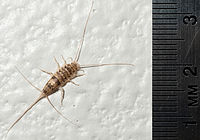Zygentoma
| Zygentoma Temporal range: Late Carboniferous–Recent |
|
|---|---|
 |
|
|
|
|
| Scientific classification | |
| Kingdom: | Animalia |
| Phylum: | Arthropoda |
| Class: | Insecta |
| Subclass: | Apterygota |
| Order: |
Zygentoma Börner, 1904 |
| Families | |
|
Lepismatidae |
|
Lepismatidae
Nicoletiidae
Lepidotrichidae
Maindroniidae
Protrinemuridae
Zygentoma are an order in the class insecta. The Zygentoma include the so-called silverfish or fishmoths, and the firebrats. A conspicuous feature of the order is that the members all have three long caudal filaments. The two lateral filaments are cerci, and the medial one is an epiproct or appendix dorsalis. In this they resemble the Archaeognatha, though, unlike in the latter order, the cerci of Zygentoma are nearly as long as the epiproct.
Until the late twentieth century the Zygentoma were regarded as a suborder of the Thysanura, but since then the Zygentoma have been raised to full order status. The rest of the Thysanura also were assigned to their own order, the Archaeognatha, so that the name Thysanura now is deprecated.
The name Zygentoma is derived from the Greek ζυγον, (zygon) in context meaning "yoke" or "bridge", and εντομα (entoma. literally "cut into" because of the anatomy of typical insects). The idea behind the name was that the taxon formed a notional link between the Pterygota and the Apterygota. This view is now totally obsolete, but the phylogeny of the insecta was in its infancy in the late 19th and early 20th century, and the name was firmly established by the time that more sophisticated views were developed.
Silverfish are so called because of the silvery glitter of the scales covering the bodies of the most conspicuous species (family Lepismatidae). Their movement has been described as "fish-like" as if they were swimming. Most extant species have a body length less than 2 centimetres (0.79 in) long, though Carboniferous fossils about 6 cm long are known.
...
Wikipedia
